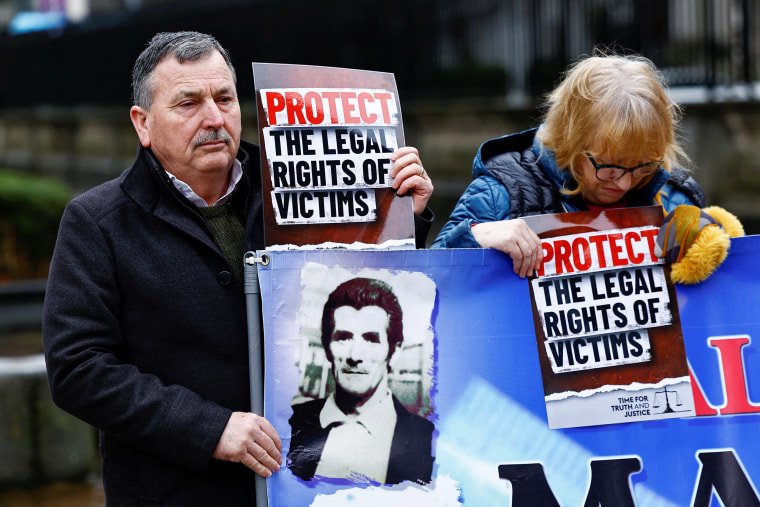The statute is opposed by the families of the victims, human rights organizations, and all of the major political parties in Northern Ireland, including Irish nationalist and British unionist.

In Short
- The belfast high court ruled that britain’s conditional amnesty law for northern ireland’s conflict violates the european convention on human rights, igniting legal challenges and political controversy.
- The statute, opposed by victims’ families and major political parties, faces scrutiny for its potential impact on justice and reconciliation efforts in the region.
TFD – The Belfast High Court’s landmark ruling declared Britain’s conditional amnesty law for Northern Ireland’s conflict as a breach of human rights, sparking controversy and legal challenges. Explore the implications for victims’ families and political stakeholders amidst ongoing debates over justice and reconciliation. Stay updated on this pivotal decision shaping the legacy of decades-long turmoil.
The offering by Britain of conditional amnesties to ex-soldiers and militants involved in Northern Ireland’s decades of violence is in breach of the European Convention on Human Rights (ECHR), Belfast’s High Court ruled Wednesday.
Judge Adrian Colton declared that the portion of the new law that was established the previous year that provided protection from prosecution to anybody who completely collaborated with a new investigating body ought to be disregarded.
The contentious law sparked more than 20 legal challenges in Northern Ireland, mostly from victims’ families, who said it contravened the ECHR and a 1998 peace deal that ended the three decades of bloodshed.
“I am convinced that the lead applicant’s rights under Article 2 of the ECHR are violated by the immunity from prosecution provisions under Section 19 of the (Northern Ireland Troubles) Act. Judge Adrian Colton informed the court, “I am also confident that they violate Article 3 of the ECHR.
“There is no proof that providing amnesty under the Act will aid in Northern Ireland’s reunification in any manner. After reading the 200-page ruling for more than two hours, Colton stated, “In fact, the evidence is to the contrary.”
The government is still committed to enforcing the legislation, according to British Northern Ireland Minister Chris Heaton-Harris, who also described the Belfast challenge as a “complex case” that would probably result in more legal action in higher courts.
The statute is opposed by the families of the victims, human rights organizations, and all of the major political parties in Northern Ireland, including Irish nationalist and British unionist.
The Irish government has contended that the British action was incompatible with its duties under the European Convention and is launching a separate legal challenge against Britain at the European Court of Human Rights.
The judge said that the exemption clauses were incompatible with the Windsor Framework agreement, which London and the European Union reached last year, which sets post-Brexit trade regulations for Northern Ireland.
In addition, he ruled that other parts of the Northern Ireland Troubles Act, such as the prohibition on some conflict-related civil lawsuits, were incompatible with the Windsor Framework and the ECHR.
Colum Eastwood, the leader of the moderate nationalist SDLP party in Northern Ireland, urged London to change course.
The over twenty challenges were whittled down to highlight cases for November hearings. The applicants’ attorneys informed the court that the victims’ relatives had endured “a form of secondary trauma” during their decades-long pursuit of justice.
Britain has defended the law, claiming it was becoming less likely that convictions related to incidents that occurred up to 55 years ago. The government’s attorney contended that the bill may put an end to the conflict and was a “logical outworking” of the Good Friday Agreement of 1998.
In three decades of conflict, pro-British “loyalist” paramilitaries, the British military, and Irish nationalist militants pursuing a united Ireland claimed the lives of about 3,600 individuals.
Conclusion
The Belfast High Court’s ruling on Britain’s conditional amnesty law underscores the complex legacy of Northern Ireland’s conflict and the ongoing quest for justice. As legal challenges persist and political tensions simmer, the decision highlights the importance of upholding human rights principles in addressing historical grievances. Let this ruling serve as a reminder of the enduring struggle for accountability and reconciliation in post-conflict societies.
Connect with us for the Latest, Current, and Breaking News news updates and videos from thefoxdaily.com. The most recent news in the United States, around the world , in business, opinion, technology, politics, and sports, follow Thefoxdaily on X, Facebook, and Instagram .
